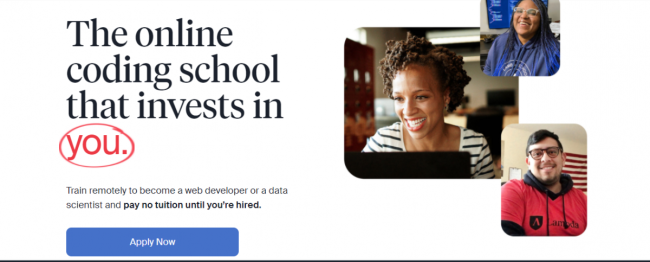You have /5 articles left.
Sign up for a free account or log in.

Lambda's website
Screenshot
Three former students are pursuing action against Lambda School, alleging that the coding boot camp falsely advertised both its job placement rates and the nature of its business model, while not having a license to operate in California. The three students are represented by the nonprofit organization National Student Legal Defense Network.
Lambda is a for-profit coding boot camp that operates short-term programs. While tuition for the six- to 12-month programs is officially set at $30,000, the company operates mostly using income-share agreements. Lambda students are not asked to pay until they are employed at a job making at least $50,000. After that, the school takes 17 percent of income for two years.
The crux of the students' allegations against Lambda concern job placement rates. While the for-profit coding school advertised between 2018 and 2020 that 80 percent or more of its graduates receive high-paying jobs using their skills within six months of graduation, the former students and their lawyers allege that other documents cast serious doubt on those claims.
For example, in May 2019, complaints allege, Lambda executives wrote in a private memo to an investor that the job placement rate was closer to 50 percent. Placement has been "manual" and one-off, the memo said, which isn’t possible to scale. At the time, the school’s website was advertising an 85.9 percent placement rate.
In early 2020, the school’s CEO, Austen Allred, acknowledged on Lambda’s website that 50 percent was “technically accurate.” The investor memo was meant to communicate risks, he said, and the number referred to the rate for enrolled students, not graduates.
Students also allege that Lambda misrepresented its incentives. Until late last month, the Lambda website declared, “We don’t get paid until you do.” But the company privately told an investor that it sells some of the income-share agreements to hedge funds, meaning it gets paid up front. The company also partnered with Edly, a digital marketplace that helps schools sell their income-share agreements to investors.
The former students allege that they were persuaded by the advertised placement rates to sign income-share agreements. One of the students, Jonathan Stickrod, dropped out of a community college program in computer science to enroll with Lambda. But once enrolled, he found that the quality of instruction was lower than advertised. The instructional staff did not hail from the “top companies and universities in the world,” as Lambda advertised and frequently couldn’t answer questions about the instructional content. The curriculum, lawyers allege, was composed of publicly available materials.
In September 2020, Lambda announced to students that it would be eliminating the role of Team Leads, who were previously paid to guide students through the material. Students would instead be asked to mentor each other and also grade their own work.
Lawyers for the students also allege that Lambda ignored an order from the California Bureau for Private Postsecondary Education to cease operations and stop enrolling students. That order was given in 2019. The school continued to operate after that and achieved approval from the bureau in 2020.
Because Lambda students agree upon enrollment to work out issues in private arbitration with the company, rather than in court, the action from the students takes the form of demands for arbitration with the American Arbitration Association. Students also cannot join together in a class action suit.
Lambda responded to the action in a statement saying it stands behind the quality of its instructors and student outcomes. The company reaffirmed that, in general, a student will pay nothing until they have a job leveraging skills learned at Lambda for $50,000 annually. Lambda agreements are flexible and student-centric, a spokesperson said. They can be paused if a student loses their job and expire after 24 payments of 60 deferred months, even if the total paid is less than $30,000. Income-share agreements include a generous refund and proration policies.
Lambda takes on more risk than other forms of education, such as vocational training or traditional higher education, the spokesperson said.
“Students in these programs don’t generally obtain refunds after signing up or taking college courses, and once students take out loans they are generally liable for repayment regardless of their income or satisfaction with their educational program,” the spokesperson said via email. “And, of course, traditional educational institutions do not routinely publish data on student outcomes, despite a growing movement to encourage them to do so.”
Alex Elson, senior counsel and cofounder at the National Student Defense Legal Network, said that the three students represent just a fraction of those who have been harmed by Lambda.
“We’ve heard from many, many students who have the exact same complaints, not just these three. Since filing we’ve heard from many more,” he said. “Our hope is that some form of global resolution will be possible.”




